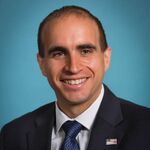User:ZeLonewolf/2022 OSMUS Position Statement
I'm Brian Sperlongano. I'm a hobbyist (I don't work in GIS or mapping), and open mapping advocate from North Kingstown, Rhode Island. I'm running for the OpenStreetMap US board of directors because I believe that OSM US is uniquely positioned to inspire and encourage the US mapping community, and act as its advocate on the world stage. As a member of the board, I hope to help OSM US find its voice as the representative of the innovative spirit of open mapping in the United States. A listing of my activities in OpenStreetMap can be found on my wiki user page.
Why a national chapter?
Most people are familiar with OpenStreetMap US through its events - the annual State of the Map US and evening "Mappy Hours". However, OSM US can and should be more than simply an events planning organization. I was pleased to be a part of OSM US's launch of the Trails Working Group to collaborate with US government agencies on the question of social trails and the harm that they cause our national parks and protected areas. Not only did we collaborate with our federal partners and companies involved in hiking renderers, but we also documented tagging systems for handling various cases of trail access that are commonly found in the US. Getting land managers, volunteer mappers, and app developers on the same page is a shining example of how a national chapter can lead from the front in tackling the important mapping issues of the day.
I believe that as a national chapter, OSM US has an important leadership role to play in the community. It is important here to draw a distinction between "leadership" and "management". Our community is a "coalition of the willing", a collection of individuals from all backgrounds and interests that have come together for the common purpose of building a better map for the widest possible variety of uses. A national chapter cannot and should not tell mappers how or what to map. However, we can and should describe to the community where the map is most lacking and periodically update the community on our progress towards closing those gaps. Each new OSM data consumer that comes online provides services to the public that make their lives better through map data. The quality of that map data determines the value that OSM-based services provide to the world! That's an awesome responsibility and we owe it to the community to promote mapping that makes a real difference in people's lives.
Open mapping is inherently a collaborative activity. Figuring out what to map, how to map it, assessing data quality, and reviewing edits are all activities that work best when mappers work hand-in-hand with each other. I'm proud that OSM US has led from the front in creating online spaces for mapper collaboration, and backed it up with a code of conduct that ensures that all are welcome. We're currently mustering 3,800 members on the OSM US Slack server! While this is a great achievement for collaboration, we can do more, as our strong tradition of open source advocacy means that many users choose not to participate in Slack due to it being a proprietary commercial product.
What can we do better?
- While "State of the Map" is the trademark for our annual conference series, we owe it to the community to periodically produce a different type of "state of the map", where we describe our progress as a national community in producing a complete map. This means taking a deep look at what map data is the most important to the broad array of data consumers and finding ways to measure and describe not only why certain map data is important, but to show mappers where it's lacking. This will encourage mappers to roll up their sleeves and pitch in on "filling in the map" in the areas that most directly impact the lives of real people.
- As an open source advocacy organization, we should embrace opening up "bridge services" that allow mappers to use open source tools for accessing Slack. This will ensure that users who have made the choice to fully-embrace open source software can fully participate in the online space that boasts the preponderance of the US community collaborations. It's important in setting up these bridge services that we still ensure that there are mechanisms to enforce the code of conduct to ensure that these services remain safe and productive spaces for all to collaborate.
- Decision-making in a community organization without anyone "in charge" is a continuing challenge in OSM! In deciding "how to map", we are governed by the principle of consensus, which is a squishy concept that we continually try to wrap our hands around. I do not believe that OSM US can or should be a decision-maker in any kind of tagging or mapping dispute. While we are a global project, we constantly face US-specific mapping challenges, such as how to classify highways, tag trails, or protected areas. The national chapter is uniquely positioned to help enable difficult decision-making through bringing people together in our communications forums and working groups, and to use the power of our platform to call the consensus when it has clearly emerged.
